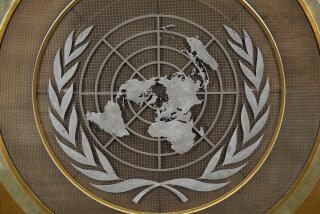The U.N. Has to Come Clean
- Share via
The demise of dictators opens previously secret files that can provide a graphic portrait of who benefited from their wrongdoing. Without fail, a closed government provides hiding places for corruption on a mass scale. Saddam Hussein’s Iraq was no exception, and the United Nations is among those tarnished by the opening of doors there. The U.N.-administered “oil for food” program that was in place from 1996 until U.S. forces toppled Hussein last year is now, finally, getting the investigation it deserves.
In January, the Iraqi newspaper Al Mada published a list that it said it obtained in the Iraqi oil ministry, naming 270 foreign businessmen and government officials from dozens of countries. Nimrod Raphaeli, a senior analyst for the Washington-based Middle East Media Research Institute, which translated the Al Mada report from Arabic, testified before a House subcommittee last week that many recipients of highly profitable “vouchers” to buy oil were from Russia. Others included “the president of Indonesia, the prime minister of Libya, the former prime minister of Yemen, a former French minister of interior” and a reported financial supporter of French President Jacques Chirac.
The U.S. General Accounting Office estimated this month that Hussein’s regime illegally siphoned off more than $10 billion from the program through supplier kickbacks and illegal surcharges. The oil-for-food program was intended to let Iraq sell oil under controlled conditions to keep civilians from suffering during a worldwide embargo.
Congress is investigating the program’s misuse, and last week the United Nations belatedly agreed to let Paul Volcker, former head of the U.S. Federal Reserve, lead a separate Security Council-authorized investigation of the program. It is important that the U.N. determine how badly the program was corrupted and who benefited. The Bush administration is looking to the U.N. to help Iraq achieve political sovereignty after June 30. Charges that its officials both enabled and profited from the corruption have undercut the organization’s credibility. Among those named is the U.N. official who ran the program, Benon Sevan; he denies the charge.
The oil-for-food program did improve living conditions for average Iraqis; the GAO said that from 1996 to 2001 the average daily food intake increased to 2,300 calories from 1,300, improvement especially important for the young and the elderly. But critics charged that Hussein also diverted funds to build his lavish palaces.
The investigations should determine who got how much money and how to get as much of it as possible back into the pockets of the Iraqi people. The U.N. needs mechanisms to prevent similar problems in future programs, especially if it takes over substantial authority in Iraq. The international goodwill and money the U.N. requires to do that work will be jeopardized if it fails to clean its own house.
More to Read
Sign up for Essential California
The most important California stories and recommendations in your inbox every morning.
You may occasionally receive promotional content from the Los Angeles Times.













